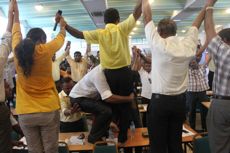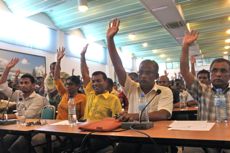“If one country has a loophole, all countries suffer,” said Immigration Controller Abdulla Shahid, referring to the Maldives’ lack of a border control system amidst rising concerns over human trafficking. “The present border control system is only helping human traffickers.”
Authorities have reported a daily increase in human trafficking to the Maldives, particularly in the case of expatriate workers. The industry has a calculated value of US$123 million, making it the second largest contributor of foreign currency.
“This is a serious issue, there are about 40,000 illegal workers in the Maldives right now,” said Minister of Foreign Affairs Ahmed Naseem. “A border control system would be useful, especially in the future for maintenance. But there is a lot to do within the country as well, and we are currently trying to address these matters.”
The Maldives currently uses an eight year-old, outdated border control system. Plans to upgrade to a modern system have been delayed for over a year on allegations of corruption.
In November 2010, the government approved a Rf500 million (US$39 million) Border Control System by Malaysia’s Nexbis Limited, proposed by the Department of Immigration and Emigration.
Shortly thereafter, the Anti-Corruption Commission (ACC) requested that the agreement be halted due to “a serious public complaint” alleging corrupt dealings. The President upheld the ACC’s request in January 2011, by in May the Cabinet approved the program.
The ACC subsequently renewed its concerns and filed a case at the Civil Court and submitted a report to the Prosecutor General’s (PG) office earlier this month. The report accuses Former Controller Ilyas Hussain Ibrahim and Director General of Finance Ministry, Saamee Aqeel, then head of the Tender Board, for allegedly abusing their authority for undue financial gain.
Nexbis threatened legal action over the delay, citing millions of dollars in losses over equipment already imported to the Maldives. Shahid noted that the equipment is still sitting in Customs.
Immigration matters
Shahid said the public misconception that Immigration is a mundane department doing no-brainer tasks has led to a general misunderstanding of need for a border control system.
“Immigration personnel have to be trained to detect forgery, to profile passengers–we recently had courses for officers on how to detect physical alterations like makeup.
“In general, the public is not aware of the system’s value. It is to everyone’s benefit, even distant countries, to have a strong border control system in the Maldives. Terrorism and human trafficking involve other countries and their borders. If we have good communication, starting at Immigration, and a system, then we have good results.”
Currently a passport check requires an individual to manually scan hundreds of photographs, Shahid said. Without the key components of a modern system – facial recognition, finger-print identification technology, and eye scans – “people who were deported on criminal violations can re-enter the country. If they have a new or fake passport, we rarely detect them with our current system,” Shahid explained.
“A passport is just a piece of paper nowadays. The modern system, with the recognition technology, is almost a 100 percent guarantee of proper identification,” he added.
Nearby Sri Lanka, Thailand and Malaysia have been using modern systems for years.
“I think the proof is strong enough”
Shahid believes that cases against Ibrahim and Aqeel will be difficult to ignore in a court of law.
When the Nexbis system was first considered, a proposal was sent by Immigration to the National Planning Council. According to Shahid’s review of the documents, the final contract drafted deviated significantly from the initial proposal.
“The proposed system could be implemented in six months for US$4-5 million, with the company charging a further US$150-200 thousand per year for maintenance,” he asserted.
“According to this, the Maldives would pay US$8 million in the first year to Nexbis. Over 20 years that would be US$4 million paid annually. That’s fair. But right now the Nexbis plan is one-third of the budget.”
Taxes are also a consideration, particularly given the high numbers of foreigners and expatriates traveling through the Maldives.
“In 2011 we are reaching 1 million foreign arrivals. If we charge US$2 for arrival and US$2 for departure, that’s US$4 per person. Annually, the government would collect US$4 million for Nexbis. It would break even.”
Nexbis proposed these charges as part of its 20-year contract with the government in 2010.
“This means that neither the government nor the Maldivian public have to pay in exchange for a state-of-the-art border security protection,” Nexbis earlier claimed.
Shahid also noted that GMR is expanding Ibrahim Nasir International Airport (INIA) to accommodate 3 million arrivals annually, indicating that revenue will increase.
Nexbis also planned to levy a US$15 fee for expatriate identification cards. With the current 100,000 registered expatriates, Shahid said, the company receives US$1.5 million annually from expatriate cards alone.
“Nexbis will get US$27.5 million in 2025, according to the current statistics,” he said. Calculating for a gradual increase of arrivals over the next 20 years, “the generated revenue could build an airport of GMR’s standards and implement an up-to-date border control system.”
According to Shahid’s calculations, the approximate cost in the first year of installment and operation (US$8 million) of a Nexbis-quality border control system is far lower than the cost proposed in the final contract (US$39 million).
Shahid earlier estimated that maintaining a free system given by a donor country would cost at most several hundred thousand dollars a year, and said he was unsure as to why such an agreement had ever been signed.
“I don’t know much about the details of the ACC’s report,” he concluded. “Since I saw the contract for the Nexbis system, my argument has always been that the amount charged is ridiculous. It should not be done and must be halted. It is wrong.”
Ilyas Hussain Ibrahim declined to comment on the grounds that the issue was “politically risky.”
The Nexbis case is currently the largest corruption case before the courts and PG, the ACC confirmed. While corruption charges are regularly issued in the Maldives, resolution at the PG level is not so common. Speaking to Minivan News on the occasion of International Anti-Corruption Day, ACC President Hassan Luthfee said that of the 16 cases filed with the PG this year, zero have been addressed.
Vice President Muaviz Rasheed today said the ACC had received no information from the PG, but was hoping for the Civil Court’s ruling by the end of this month.
“The Civil Court has not been cooperative with the ACC on all counts, however the hearings ended in late November and we expect a ruling within the month,” Muaviz said.
Banana republic?
Although Shahid is confident in the court, he is unsure when the Maldives will take actual steps towards updating its border control system.
Without local capacity and expertise to produce a state-of-the-art border control system, the Maldives would turn again to the international market. Shahid said there are many options: “we could go anywhere, we could even get it as foreign aid.”
But after the dealing with Nexbis, withstanding international scrutiny could be difficult.
“Nexbis sees the Maldives as a banana republic that it can squeeze money out of,” Shahid observed.
With a score of 2.5 on Transparency International’s Corruption Perception Index and ranking 134th out of 185 countries, the Maldives may not be so inviting to foreign investors.
Likes (0)Dislikes
(0)Dislikes (0)
(0)
 (0)Dislikes
(0)Dislikes (0)
(0)
